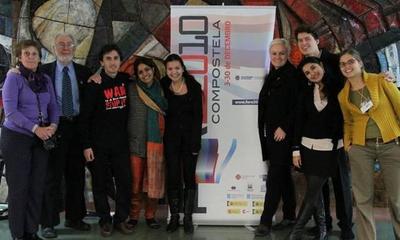|
|
World Report on the Culture of Peace
an article by Marcos Estrada de Oliveira
The World Culture of Peace Report from the Civil Society was submitted to the United Nations to mark the end of the UN Decade for a Culture of Peace and Non-Violence for the Children of the World (2001-2010). It concludes that despite the ending of the Decade, the global movement for a culture of peace is just beginning.

Youth team with advisors
(left to right) Alicia Cabezudo and David Adams (advisors)
Marcos Estrada, Shreya Jani, Meg Villanueva,
Lillian Solheim, Oliver Rizzi-Carlson, Johanna Ospina, Cecile Barbeito
click on photo to enlarge
The report was gathered and written by an international youth team (see photo) who worked intensively over a period of six months. It is available on the Internet at the Decade Report Website, along with detailed data from all of the 1000 organizations that contributed to the report.
The report was submitted by the Bangladesh ambassador to the United Nations Secretary General with a request that he transmit it to the UN General Assembly (GA) as had been requested previously by GA resolution A/63/80. Although the Secretary General has not responded, copies of the report were distributed by hand to the GA Member State representatives during their debate on the Decade at the United Nations.
The report was acknowledged in the final resolution for the Decade, which "commends civil society, non-governmental organizations and young people for their activities in further promoting a culture of peace and non-violence, including through their campaign to raise awareness on a culture of peace, and takes note that one thousand and fifty-four organizations from the civil societies of more than one hundred countries have observed the International Decade, as called for in paragraph 13 of resolution 64/80."
The youth team continues to present the findings of the report at meetings and conferences around the world, and is considering how to continue the exchange of information about culture of peace initiatives, including the further development of the Culture of Peace News Network
(Click here for a Portuguese version of this article)
|








|
DISCUSSION
Question(s) related to this article:
How can we know if the culture of peace is advancing?,
* * * * *
Latest reader comment:
One way we can NOT know if the culture of peace is advancing is from projects like the Global Peace Index which has recently been reviewed in CPNN.
The Global Peace Index measures the old dimensions of war and peace, not the new dimensions of culture or war / culture of peace. Peace, in the old paradigm was the period between wars when countries were preparing themselves for the next war. Culture of Peace, the new paradigm, is concerned with the deep roots of war, its cultural basis.
That can explain the paradox that it is the wealthy countries of the North that score highest on the index (Denmark, Austria, Switzerland and Finland), countries of Europe, which was involved in both the World Wars and which continue to profit from the unequal terms of trade between North and South which is enforced by the culture of war.
When I was at UNESCO, the African ambassadors had the following to say: "One should not look to the South for the causes of the culture of war; instead, pose three questions. From where do the weapons come? From where do the violent television programmes come? And where are the terms of trade decided that impoverish the people of the South which leads to violence? "

|
|








